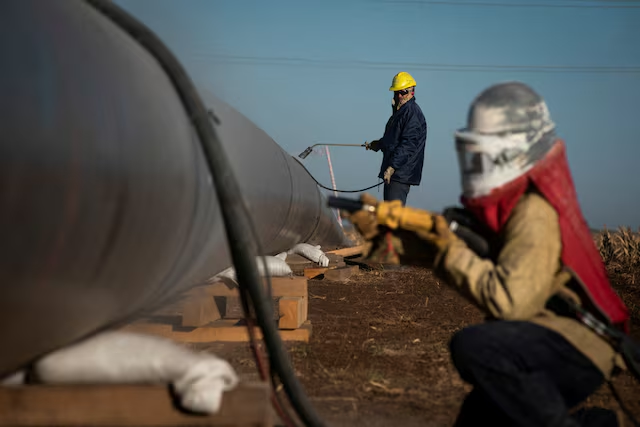 People work during the construction of the Nestor Kirchner gas pipeline in Macachin, La Pampa, Argentina April 26, 2023. REUTERS/Martin Cossarini/File Photo Purchase Licensing Rights
People work during the construction of the Nestor Kirchner gas pipeline in Macachin, La Pampa, Argentina April 26, 2023. REUTERS/Martin Cossarini/File Photo Purchase Licensing Rights
Natural gas exports from Bolivia to Argentina have come to an end after almost two decades, a spokesperson for Bolivian state-run firm YPFB confirmed to Reuters on Wednesday, as output in the Andean nation dwindles and Argentina moves closer to becoming an exporter of the fuel.
Argentina, which has had a negative energy trade balance for years, is nearing the completion of projects that will allow it for the first time to export gas to its South American neighbors via pipeline and to global markets through liquefied natural gas (LNG) shipments.
Data from Argentina's gas regulator showed no imports from Bolivia, Argentine media said earlier this week. Imports from the Andean nation, which once was a prominent gas producer in the region, ended on Sept. 18, though Bolivian gas supply continues to Brazil, the spokesperson said.
Bolivia's supply to Argentina had declined to as low as 2 million cubic meters per day (mcm/d), a fraction of Argentina's 130-mcm/d consumption, executives from producers with operations in the two countries said earlier this year.
The supply was set to end in July, according to a deal in 2022, but the countries later agreed to a two-month extension. Unusually warm weather at the end of the Southern Hemisphere's winter and lower gas demand allowed Argentina to cease the imports, a spokesperson for Enarsa, Argentina's state-owned energy company, said on Wednesday.
The announcement from Yacimientos Petroliferos Fiscales Bolivianos (YPFB) brings to an end almost 20 years of Bolivian gas exports to Argentina.
Energy companies from Argentina and Brazil are in negotiations to export gas from Argentina's Vaca Muerta shale formation by reversing a network of Bolivian pipelines that has brought gas south, as part of an effort to address a regional shortfall.
A preliminary proposal on the pipeline shift initially failed to gain traction with Bolivia, according to executives and sources, leaving Brazil increasingly exposed to volatile LNG prices.
The YPFB spokesperson said on Wednesday that the company was waiting for a response from the Argentine government over how to proceed, and pointed to issues over tariff negotiations to transport the gas which have delayed talks.
A proposal by Bolivia in June to charge a fee for the passage of Argentina's gas to Brazil through the existing line was "too high," an Argentinian government official told Reuters this month.
Negotiations have progressed slowly since then, he added. Meanwhile, government officials and companies from Brazil and Argentina are exploring other routing options, including through Uruguay and Paraguay.
But reversing the flow of Bolivia's pipeline remains the easiest and fastest option to secure Argentina's gas for its neighbors, experts have said.
